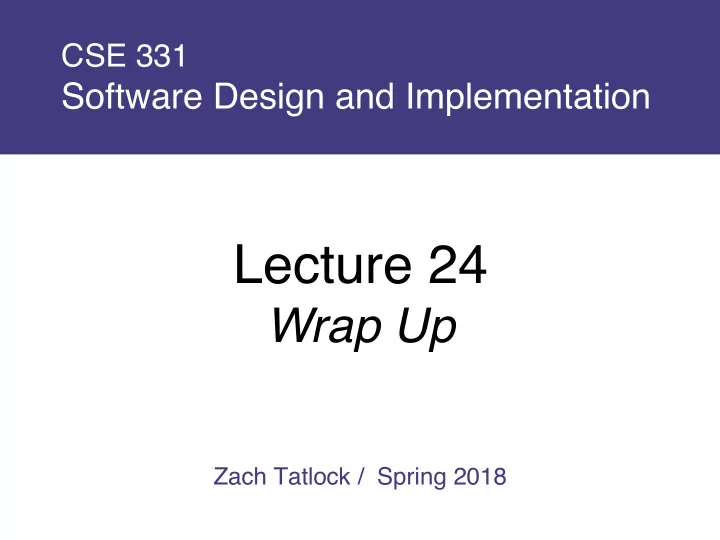

CSE 331 Software Design and Implementation Lecture 24 Wrap Up Zach Tatlock / Spring 2018
Final Logistics Wednesday, 8:30 - 10:20 AM Comprehensive, weighted towards 2 nd half Old exams on the web; some questions won’t apply if we didn’t do similar things
Today Course Reviews Project demos Final logistics (here at 8:30am on Wednesday!) A look back at CSE 331 High-level overview of main ideas and goals Connection to homework and broader context Also: THANK YOU :)
CSE 331 What was it all about? But first….
Huge thanks to the folks who made it work Course staff: Weifan Jiang, Cody Kesting, Tim Chirananthavat, Alexey Beall, Hongtao Huang, Jake Sippy, Chen (Jason) Qiu, Leah Perlmutter, Zhu (Ruby) Li, Yifan (Vanadis) Xu Special thanks to all of you :) This course is itself a sophisticated system requiring design, implementation, and debugging ;)
Credits Great course material based on work by: – Michael Ernst – Hal Perkins – Dan Grossman – David Notkin – Dozens of amazing TAs – Hundreds of incredible students (you!)
From our first lecture…
The Big Picture
Welcome! 10 week study of the craft of programming How do we build good programs? “Controlling complexity is the essence of computer programming.” -- Brian Kernighan (UNIX, AWK, C, …)
Controlling Complexity
Controlling Complexity
Learning to Control Complexity First, we need to refine our goals: – What quality makes a program good? – How can we tell if a program is good? – How do we build good programs? To answer, we’ll learn principles and use tools: – Modularity, documentation, testing, verification – Tools: Java, IDEs, debuggers, JUnit, JavaDoc, git Tools change, principles are forever.
10 weeks ago: Welcome! We have 10 weeks to move well beyond novice programmer : Larger programs – Small programs are easy: “code it up” – Complexity changes everything: “design an artifact” – Analogy: using hammers and saws vs. making cabinets (but not yet building houses) Principled, systematic software: What does “it’s right” mean? How do we know “it’s right”? What are best practices for “getting it right”? Effective use of languages and tools: Java, IDEs, debuggers, JUnit, JavaDoc, git, Checker Framework, … – Principles are ultimately more important than details • You will forever learn details of new tools/versions
10 weeks ago: Goals CSE 331 will teach you to how to write correct programs What does it mean for a program to be correct? – Specifications What are ways to achieve correctness? – Principled design and development – Abstraction and modularity – Documentation What are ways to verify correctness? – Testing – Reasoning and verification
10 weeks ago: Managing complexity Abstraction and specification – Procedural, data, and control flow abstractions – Why they are useful and how to use them Writing, understanding, and reasoning about code – Will use Java, but the issues apply in all languages – Some focus on object-oriented programming Program design and documentation – What makes a design good or bad (example: modularity) – Design processes and tools Pragmatic considerations – Testing – Debugging and defensive programming – [more in CSE403: Managing software projects]
Some new slides to tie the pieces together…
Divide and conquer: Modularity, abstraction, specs No one person can understand all of a realistic system • Modularity permits focusing on just one part • Abstraction enables ignoring detail • Specifications (and documentation) formally describe behavior • Reasoning relies on all three to understand/fix errors – Or avoid them in the first place – Proving, testing, debugging: all are intellectually challenging
How CSE 331 fits together Þ Assignments: get practice Lectures: ideas Þ Design classes Specifications Þ Write tests Testing Þ Write subclasses Subtyping Þ Override equals, use collections Equality & identity Þ Write generic classes Generics Þ Larger designs; MVC Design patterns Þ Correctness, testing Reasoning, debugging Þ GUIs Events Þ N/A Systems integration
We’ve come far in CSE 331! Compare your skills today to 10 weeks ago – Theory: abstraction, specification, design – Practice: implementation, testing – Theory & practice: correctness Bottom line aspiration: Much of what we’ve done would be easy for you today This is a measure of how much you have learned There is no such thing as a “born” programmer! Genius is 1% inspiration and 99% perspiration. Thomas A. Edison
DEMOS
What you will learn later • Your next project can be much more ambitious – But beware of “second system” effect • Know your limits – Be humble (reality helps you with this) • You will continue to learn – Building interesting systems is never easy • Like any worthwhile endeavor – Practice is a good teacher • Requires thoughtful introspection • Don’t learn only by trial and error! – Voraciously consume ideas and tools
What comes next? Courses – CSE 403 Software Engineering • Focuses on requirements, software lifecycle, teamwork – Capstone projects – Any class that requires software design and implementation Research – In software engineering & programming systems – In any topic that involves software Having an impact on the world – Jobs (and job interviews) – Larger programming projects
Final slide System building is fun! – It’s even more fun when you’re successful Pay attention to what matters – Take advantage of the techniques and tools you’ve learned (and will learn!) On a personal note: – Don’t be a stranger: I love to hear how you do in CSE and beyond as alumni Closing thoughts?
Recommend
More recommend